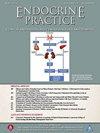The Stress-Induced Hyperprolactinemia Might Not Be that Stress-Induced as Argued: Observational Case-Control Study
IF 3.7
3区 医学
Q2 ENDOCRINOLOGY & METABOLISM
引用次数: 0
Abstract
Objective
The mechanism behind prolactin (PRL) elevation in stress-induced hyperprolactinemia (si-HP) in humans is unclear. This study aimed to investigate the effect of psychological stress and venous puncture (VP) pain on si-HP.
Methods
The study included 91 individuals (9 males, 82 females) referred for HP. Anxiety levels were assessed using the Anxiety Sensitivity Index-3 (ASI-3) and the State-Trait Anxiety Inventory (STAI-1 and STAI-2), and visual scales were used to evaluate trypanophobia, nosocomephobia, and scanxiety. Serial PRL measurements were performed with venous cannula (VC) at 0 minute (min), 30 min, and 60 min for the first 32 patients and with the VP method at the same intervals for the following 59 patients. si-HP was defined as PRL levels at 60 min (PRL 60min) decreasing to normal limits according to gender.
Results
There were 23 HP (−), 25 HP (+), and 19 si-HP individuals, as well as 24 with macroprolactinaemia. The frequency of si-HP in the VC group (n = 7/32) was similar to that in the VP group (12/59, P = .9). The prolactin levels at 0 minute (PRL0min) and prolactin levels at 60 minutes (PRL60min) levels of the VC group were similar to those of the VP group. Trypanophobia, nosocomephobia, scanxiety, ASI-3, STAI-1, and STAI-2 scale scores were similar between the si-HP group and other groups. Trypanophobia, nosocomephobia, scanxiety, ASI-3, STAI-1, and STAI-2 scales scores were not correlated with PRL0min or PRL60min levels.
Conclusion
Si-HP is independent of states momentary or trait anxiety, and phobias trypanophobia, nosocomephobia and scanxiety. In this context, the relevance of the nomenclature of si-HP is controversial.
压力诱发的高泌乳素血症可能并非如争论的那样是压力诱发的:观察性病例对照研究。
目的:人类应激诱导的高泌乳素血症(si-HP)中泌乳素(PRL)升高的机制尚不清楚。本研究旨在探讨心理压力和静脉穿刺(VP)疼痛对 si-HP 的影响:研究包括 91 名转诊为高催乳素血症的患者(9 名男性,82 名女性)。使用焦虑敏感指数-3(ASI-3)和状态-特质焦虑量表(STAI-1和STAI-2)评估焦虑水平,并使用视觉量表评估锥虫恐惧症、鼻腔恐惧症和扫描焦虑。前32名患者在0分钟、30分钟和60分钟时使用静脉插管(VC)进行PRL序列测量(SPM),后59名患者在相同时间间隔内使用VP法进行测量:结果:共有 23 名 HP (-)、25 名 HP (+) 和 19 名 si-HP 患者,以及 24 名巨乳血症患者。VC组(n=7/32)中出现si-HP的频率与VP组(12/59,p=0.9)相似。VC 组的 PRL0min 和 PRL60min 水平与 VP 组相似。si-HP组与其他组之间的胰岛素恐怖症、恶心恐怖症、扫描焦虑症、ASI-3、STAI-1和STAI-2量表评分相似。Si-HP与PRL0min或PRL60min水平无关:结论:Si-HP与瞬时焦虑或特质焦虑状态、恐惧症、恐喷症和扫描焦虑无关。在这种情况下,Si-HP 命名法的相关性存在争议。
本文章由计算机程序翻译,如有差异,请以英文原文为准。
求助全文
约1分钟内获得全文
求助全文
来源期刊

Endocrine Practice
ENDOCRINOLOGY & METABOLISM-
CiteScore
7.60
自引率
2.40%
发文量
546
审稿时长
41 days
期刊介绍:
Endocrine Practice (ISSN: 1530-891X), a peer-reviewed journal published twelve times a year, is the official journal of the American Association of Clinical Endocrinologists (AACE). The primary mission of Endocrine Practice is to enhance the health care of patients with endocrine diseases through continuing education of practicing endocrinologists.
 求助内容:
求助内容: 应助结果提醒方式:
应助结果提醒方式:


